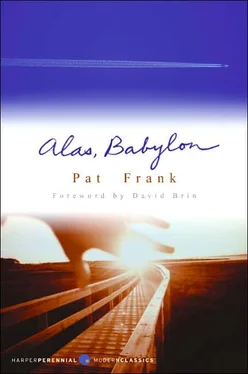One evening near the end of the month Dan Gunn returned from his clinic, smiling and whistling. “Randy,” he said. “I have just delivered my first post-Day baby! A boy, about eight pounds, bright and healthy!”
“So what’s so wonderful about delivering a baby?” Randy said. “Was the mother under hypnosis?”
“Yes. But that’s not what was wonderful.” Dan’s smile disappeared. “You see, this was the first live baby, full term. I had two other pregnancies that ended prematurely. Nature’s way of protecting the race, I think, although you can’t reach any statistical conclusion on the basis of three pregnancies. Anyway, now we know that there’s going to be a human race, don’t we?”
“I’d never really thought there might not be.”
“I had,” Dan said quietly.
In November a tall pine, split by lightning during the summer, dropped its brown needles and died and Randy and Bill felled it with a two-man saw and ax. It was arduous work and neither of them knew the technique. It was at times like this that Randy missed and thought of Malachai. Nevertheless they got the job done and trimmed the thick branches. The wood was valuable, for another winter was coming.
Randy went to bed early that night, exhausted. He woke suddenly with a queer sound in his ears, like music, almost. He looked at his watch. It was a bit after midnight. Lib slept quietly beside him. He was frightened. He nudged her. She lifted her head and her eyes opened. “Sweetheart,” he said, “do you hear anything?”
“Go to sleep,” she said, and her head fell back on the pillow. It bounced up again. “Yes,” she said, “I do hear something. It sounds like music. Of course it can’t be music but that’s what it sounds like.”
“I’m relieved,” Randy said. “I thought it was in my head.” He listened intently. “I could swear that it sounds like ‘In the Mood.’ If I didn’t know better I could swear it was that great Glenn Miller recording.”
She kicked him. “Get up! Get up!”
He flung himself out of bed and opened the door to the upstairs living room, lit by a lamp on the bar, turned low. It was necessary to keep fire in the house for they no longer had matches, flints, or lighter fluid. Randy thought, it must be the transistor radio, started up again, but at the same time he knew this was impossible because he long ago had thrown away the dead batteries. Nevertheless he picked up the radio and listened. It was silent yet the music persisted.
“It’s coming from the hall,” Lib said.
They opened the door into the hallway. The rhythm was louder but the hall was empty. Randy saw a crack of light under Peyton’s door. “Peyton’s room!” he said.
He put his hand on the door handle but decided it would be gentlemanly to knock first. After all, Peyton was twelve now. He knocked.
The music stopped abruptly. Peyton said, in a small, frightened voice, “Come in.”
Peyton’s room was illuminated by a lamp Randy had never seen before. Peyton didn’t have a lamp of her own. On Peyton’s desk was an old-fashioned, hand crank phonograph with flaring horn. Stacked beside it were albums of records.
Randy said, softly, “Put it on again, Peyton.”
Peyton stopped plucking at the front of her pajamas, hand me-downs from Ben Franklin, just as Ben’s pajamas were hand-me downs from Randy, so fast did children grow. She started the record, from the beginning. Hearing it, Randy realized how much he had missed music, how music seasoned his civilization. In the Henry house Missouri often sang, but in the Bragg house hardly anyone could carry a tune, or even hum.
Over the rhythm, Lib whispered, “Where did you get it, Peyton? Where did it come from?”
“The attic. I went up the little ladder in the back hall. Mother will be furious. She told me never to go up there because the rungs were cracked and I might fall.”
“Your mother was up in the attic a few months ago. She didn’t see anything.”
“I know. I was crawling around behind the big trunk and there was a door, a board door that looked like part of the wall. I opened it and there was another room, smaller.”
Randy said, “Why did you do it, Peyton?”
“I don’t know. I was lonely and there wasn’t anything else to do and I’d never been up there. You know how it is. When you’ve never been some place, you want to go.”
Randy opened one of the albums. “Old seventy—Bights,” he said, his voice almost reverent. “Classic jazz. Listen to this. By Tommy Dorsey—‘Come Rain or Shine,’ ‘Stardust,’ ‘Chicago,’ Carmen Cavallaro’s ‘Stormy Weather.’ Also ‘Body and Soul.’ Artie Shaw’s ‘Back Bay Shuffle.’ All the best by the best. I guess I’m certain this must have been Father’s collection. I’ve never seen this machine before, but I remember the records.”
‘In the Mood’ ended. Randy said, “Turn it over, Peyton. No. Put on this one.”
“You’re not angry, Randy?” Peyton said.
“Angry! I should say not!”
“I found some other stuff in there too.”
“Like what?”
“Well, there’s an old-time sewing machine—the kind you work with your feet. There are some big kerosene lamps, the kind that hang. This one on the desk I found up there, too. All I had when I went up was a little stub candle. Then there’s an old potbellied stove and a lot of iron pipe. Oh, and lots of other junk. I left it because I wanted to try the record player. The only other thing I brought down I brought for you and Dan, Randy. It’s there on the bed.”
Randy picked up the black leather case. It looked familiar. He had seen it before. He opened it and saw the two matched straight-edge razors that had belonged to his father.
He leaned over and kissed the top of Peyton’s head. “Don’t worry about what your mother will say,” he told her. “I’ll handle everything for you. If I had medals to give, I would pin one on you, Peyton, right now.”
In this manner, Peyton became a heroine.
One morning in November, when Randy was breakfasting early and alone, Dan Gunn came downstairs smooth-shaven, his jaw looking oddly pallid in contrast to brown forehead, nose, cheekbones, and neck. “Good morning,” Randy said. “You swore you’d never shave again! Why?”
“Well,” Dan said lamely, “I had the razor and it seemed a shame not to use it after Peyton gave it to me. Then there was the soap.” Within the past few weeks, bars of homemade soap had appeared in Marines Park, produced by Mrs. Estes, who had been senior teller at the bank, and two former co-workers. Everyone agreed that it would be a prosperous and rewarding business. “The truth, Dan!” Randy said.
“Helen asked me to do it. She said she was getting tired of trimming it.”
“Oh, that’s different. You’d better be home in time for dinner tonight. John Garcia just made another run up to Blue Crab Pool and he’s dropping off a washtub of crabs here. In exchange for one quart of lightning.”
Dan said, “I’m very fond of Helen. I don’t know what I’d do without her.”
“Why do anything without her?”
“Randy, I want to marry her.”
Randy rose from the table, bowed, and said, “I give you my blessing!”
“It isn’t funny.”
“Marriage is rarely funny.”
“She won’t marry me.”
“Then why did you shave off your beard?”
“Damn it, Randy, I love her. And she loves me. She admitted it. She wants to marry me. But she won’t. She thinks there’s a chance Mark’s still alive. She’s afraid that if we married then Mark would turn up alive and there’d be one of those awful messes we’ve all heard about or read about. Like when men were reported dead in the Philippines or Korea and they turned up after the war in an enemy prison camp. They came home and found their wives happily married to someone else. Sometimes there were children. It’s always a mess.”
Читать дальше












